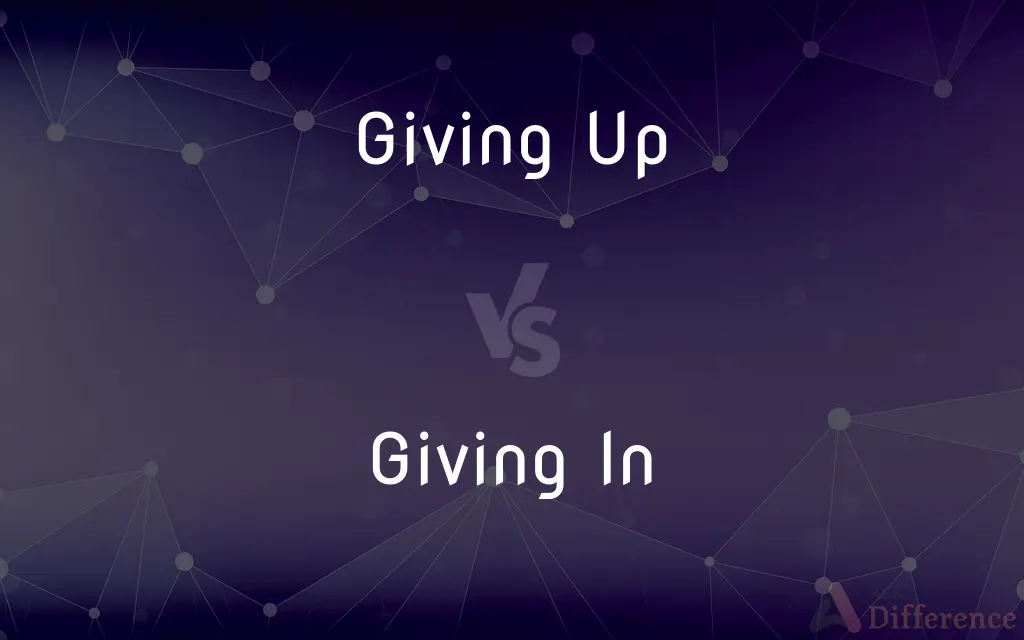Giving Up vs. Giving In — What's the Difference?
By Tayyaba Rehman — Published on November 25, 2023
Giving Up means to stop trying while Giving In conveys yielding or succumbing to something.

Difference Between Giving Up and Giving In
Table of Contents
ADVERTISEMENT
Key Differences
Giving Up and Giving In, while both signify a cessation of effort in some form, have nuanced distinctions that lie primarily in the contexts in which they are employed. Giving Up generally denotes an act of relinquishing, surrendering, or abandoning a pursuit or struggle, often connected to a personal goal or aspiration. This may indicate a resignation, a letting go of something mentally or physically, born either from despair or a strategic decision. In contrast, Giving In connotes a form of surrender as well but does so usually in response to external pressure or demands. It implies a yielding or acquiescing to an opposing force or viewpoint, often after a period of resistance or contention, thereby accepting or allowing what one previously opposed.
Both terms find utility in varied contexts, yet they provide distinct meanings and emotional undertones. Giving Up often engenders a feeling of defeat or failure, as it suggests a surrender emerging from an inability to continue, whether due to fatigue, discouragement, or a lack of belief in the possibility of success. Whereas, Giving In carries an undertone of concession, a strategic or forced surrender often resulting from a compromise or the recognition of the futility in continued resistance.
The act of Giving Up is frequently seen as a personal, internal decision, usually being a choice (whether difficult or not) to stop engaging in a particular activity or pursuit. This could emanate from a variety of emotional or logical sources and may not necessarily be in response to an external entity or pressure. Giving In, on the other hand, is typically a response to an external entity or force, suggesting a sort of dialogical interaction where one party bends to the will or demands of the other.
Interestingly, both terms can have negative or positive connotations depending on the context in which they’re used. Giving Up can be seen negatively as it often equates with quitting, but it can also be positive if one is giving up a harmful habit or practice. Similarly, Giving In might be viewed negatively as surrendering one’s autonomy or principles, but positively when it reflects a willingness to compromise or accept a different perspective.
These nuances elevate the importance of choosing between Giving Up and Giving In with care in verbal and written communication. Using them interchangeably may not always communicate the intended message or emotion. Given the subtle differences, it’s pivotal to align the choice of term with the specific context, emotional tone, and relational dynamics being conveyed.
ADVERTISEMENT
Comparison Chart
Definition
Ceasing to engage or try
Yielding or acquiescing
Implication
Often implies defeat
Can imply compromise
Tone
Can be neutral or negative
Can be neutral or positive
Relation to External Pressure
Not always related
Often related
Autonomy
May be a personal decision
Usually a response to others
Compare with Definitions
Giving Up
Stopping an activity or habit.
He is giving up smoking for his health.
Giving In
Surrendering in a contest or battle.
After a long debate, he gave in to the opposing argument.
Giving Up
Abandoning a pursuit or hope.
After years, she thought of giving up the dream.
Giving In
Accepting or permitting reluctantly.
He didn't like the plan but gave in anyway.
Giving Up
Rejecting or dismissing an option.
She is giving up dessert to lose weight.
Giving In
Agreeing after initial resistance.
She didn’t want a pet, but gave in to her children's pleas.
Giving Up
Relinquishing a position or possession.
She is giving up her seat to the elderly man.
Giving In
Succumbing to pressure or temptation.
After hours of begging, she finally gave in and bought the toy.
Giving Up
Ceasing efforts to achieve an aim.
He contemplated giving up, but persevered.
Giving In
Yielding to another’s will or command.
He didn't want to go, but gave in to peer pressure.
Common Curiosities
Can “Giving Up” be a positive action?
Yes, “Giving Up” can be positive when it involves relinquishing a harmful habit or belief.
Does “Giving Up” always denote failure?
Not necessarily. It might indicate a strategic choice or acceptance of a situation.
Does “Giving Up” always involve a personal goal?
Often, but it can also involve surrendering possessions or claims to others.
Is “Giving In” always due to external pressure?
Often, but not always. “Giving In” typically involves some form of external influence or persuasion.
Can “Giving In” be viewed as a strength?
Yes, in contexts like compromising or avoiding conflict, “Giving In” may be seen positively.
Can “Giving Up” imply letting go?
Yes, “Giving Up” often involves a releasing or letting go of something.
Can “Giving In” involve a change in belief?
Yes, “Giving In” can sometimes indicate adopting a different perspective or belief.
Can “Giving Up” be an empowered choice?
Yes, “Giving Up” can be a conscious, empowered decision in certain contexts.
Do “Giving Up” and “Giving In” mean the same?
No, “Giving Up” implies ceasing to try, while “Giving In” means yielding or acquiescing.
Can “Giving Up” be temporary?
Yes, one can give up temporarily and choose to resume later.
Can “Giving Up” be involuntary?
Typically it’s a choice, but it can feel involuntary under certain pressures.
Can “Giving In” be a strategy?
Yes, sometimes “Giving In” is used as a strategy to avoid conflict or conserve resources.
Is “Giving In” related to compromise?
Yes, “Giving In” often involves a degree of compromise or acquiescence.
Does “Giving In” imply weakness?
Not necessarily. It can imply flexibility or pragmatism in certain situations.
Is “Giving In” synonymous with surrender?
It can be, but “Giving In” may not carry the finality that surrender often implies.
Share Your Discovery

Previous Comparison
Alloy Steel vs. Carbon Steel
Next Comparison
Natural Fiber vs. Synthetic FiberAuthor Spotlight
Written by
Tayyaba RehmanTayyaba Rehman is a distinguished writer, currently serving as a primary contributor to askdifference.com. As a researcher in semantics and etymology, Tayyaba's passion for the complexity of languages and their distinctions has found a perfect home on the platform. Tayyaba delves into the intricacies of language, distinguishing between commonly confused words and phrases, thereby providing clarity for readers worldwide.
















































